10 Essential Tools for Entrepreneurs to Succeed in 2025
The entrepreneurial world is moving faster than ever in 2025, driven by breakthroughs in AI, automation, and the shift toward remote work. Navigating this landscape can be challenging, but the right approach gives businesses a competitive edge.
Success now depends on choosing the most effective tools for entrepreneurs, empowering founders to boost productivity, streamline operations, and accelerate growth.
In this article, discover a curated list of 10 essential platforms every modern entrepreneur should know. From productivity and finance to marketing, collaboration, and continuous learning, these recommendations are designed to help you build a future-ready business toolkit.
The Evolving Entrepreneurial Landscape in 2025
The world of entrepreneurship is transforming at an unprecedented pace. Digital innovation is no longer just a buzzword—it is the reality shaping how founders build, scale, and operate their businesses. In this new landscape, leveraging the right tools for entrepreneurs is key to staying ahead of the curve.
A Digital Revolution for Entrepreneurs
Entrepreneurs today are navigating a landscape shaped by rapid digital transformation. The acceleration that began in the early 2020s has only intensified. Cloud computing, mobile-first solutions, and the proliferation of SaaS platforms have created a foundation where agility and innovation come standard.
The rise of digital-first businesses means that traditional approaches are being replaced with smarter, data-driven decisions. For modern founders, adopting tools for entrepreneurs is essential to compete and thrive.
Key Trends Shaping 2025
Several game-changing trends are redefining how startups operate:
| Trend | Impact on Entrepreneurs |
|---|---|
| AI Integration | Automates tasks, enhances decision-making |
| Remote/Hybrid Work | Enables global teams, flexible operations |
| Automation | Increases efficiency, reduces manual work |
| Global Collaboration | Access to wider talent and markets |
AI-powered platforms now handle everything from customer support to financial forecasting. Remote and hybrid work models have become standard, allowing founders to assemble teams from around the globe. Automation is streamlining workflows, freeing up time for creative problem-solving.
For deeper insights into these trends and the most impactful tools for entrepreneurs, check out the Startup technology trends 2025.
Challenges in the Modern Entrepreneurial World
This evolution brings new challenges. The competition is fiercer than ever, with more founders entering global markets. Efficiency is critical—distributed teams must stay aligned and productive despite working across time zones.
Many entrepreneurs struggle to manage the growing number of platforms and integrations. Selecting the right mix of tools for entrepreneurs can make or break a business’s ability to adapt quickly.
Data-Driven Success: The SaaS Advantage
Data shows that startups embracing SaaS have a measurable edge. According to recent studies, SaaS adoption among startups and SMEs has skyrocketed, with the average business now using dozens of cloud-based applications.
During the pandemic, businesses that shifted early to cloud-based tools for entrepreneurs outperformed their competitors. They were able to pivot operations, maintain customer relationships, and scale faster in uncertain times.
Why the Right Tools Are Non-Negotiable
In 2025, having the right tools for entrepreneurs is no longer a luxury. It is a lifeline. The ability to automate processes, collaborate remotely, and analyze data in real time is essential for survival and growth.
Continuous learning and adaptability are now critical skills. Entrepreneurs must not only keep up with technology but also understand how to integrate and optimize these solutions for their unique needs.
Preview: The Entrepreneur’s 2025 Toolkit
What does this all mean for founders? The digital toolkit is more diverse, powerful, and necessary than ever. From collaboration platforms to financial management, marketing automation, and continuous learning resources, these tools for entrepreneurs form the backbone of every resilient startup.
In the next section, we will explore a curated list of ten indispensable tools, each designed to empower entrepreneurs to meet the demands of 2025 and beyond.
10 Essential Tools for Entrepreneurs to Succeed in 2025
The right tools for entrepreneurs can make all the difference between surviving and thriving in 2025. With digital transformation accelerating, entrepreneurs need solutions that streamline workflows, boost collaboration, and drive growth. Below, you’ll find a curated list of 10 essential tools for entrepreneurs, each handpicked for their ability to solve modern challenges and empower business leaders to succeed in a fast-moving landscape.
This toolkit covers productivity, finance, marketing, collaboration, and learning. Whether you’re launching your first venture or scaling a growing startup, these tools for entrepreneurs will help you stay agile and competitive.
Notion
Notion stands out as one of the most versatile tools for entrepreneurs in 2025. It combines notes, docs, project management, and databases into a single, customizable workspace.
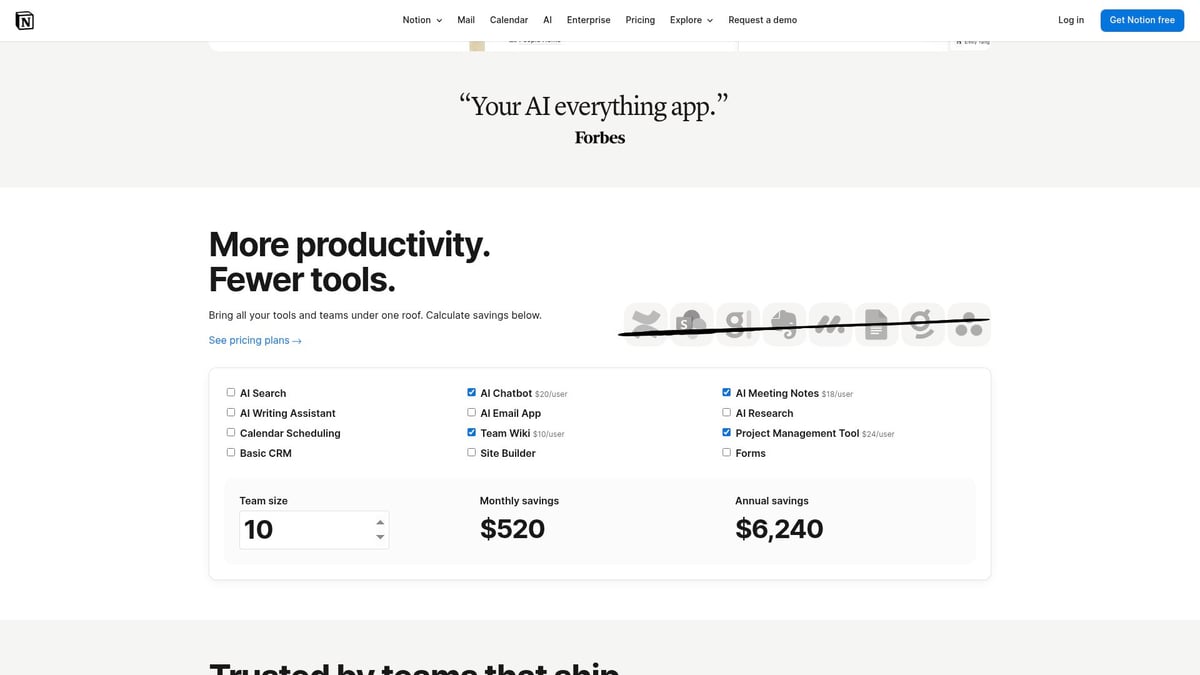
Pricing is accessible, with a free plan and paid options starting at $8 per user per month. Notion’s all-in-one approach centralizes information, making it a favorite among solopreneurs and remote teams. You can build anything from product roadmaps to company wikis, all tailored to your workflow.
Key benefits include seamless integration with hundreds of apps and a strong, supportive community. Notion’s flexibility makes it scalable as your business grows. However, some users find the learning curve steep for advanced features.
For example, many startups use Notion to manage OKRs, track meeting notes, and keep the whole team aligned. If you’re seeking adaptable tools for entrepreneurs that grow with you, Notion is a top contender.
Swisspreneur
Swisspreneur is a unique platform designed to fuel learning and connections within the Swiss startup scene. As one of the leading tools for entrepreneurs focused on knowledge and networking, it offers free access to podcasts, masterclasses, eBooks, and a thriving community.
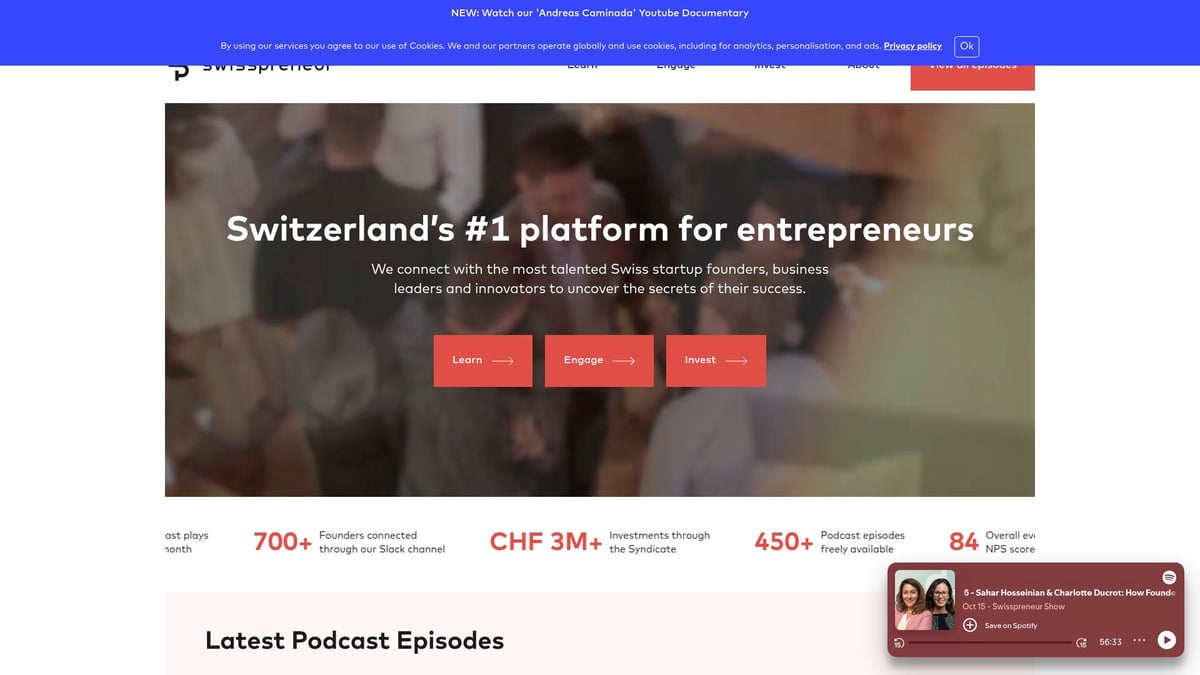
Entrepreneurs benefit from actionable advice delivered by successful founders and experts. Swisspreneur’s masterclasses and events help you refine fundraising strategies and expand your network. The investment syndicate feature allows you to connect with funding opportunities starting from CHF 5,000.
While the platform is best suited for those in or connected to Switzerland, its high-quality content and community support are unmatched. Startups often leverage Swisspreneur masterclasses to prepare for investment rounds or sharpen their business models, making it a valuable addition to your suite of tools for entrepreneurs.
Slack
Slack has become a communication powerhouse and is essential among tools for entrepreneurs managing distributed or hybrid teams. Its real-time messaging, channels, and integrations create a virtual office where collaboration thrives.
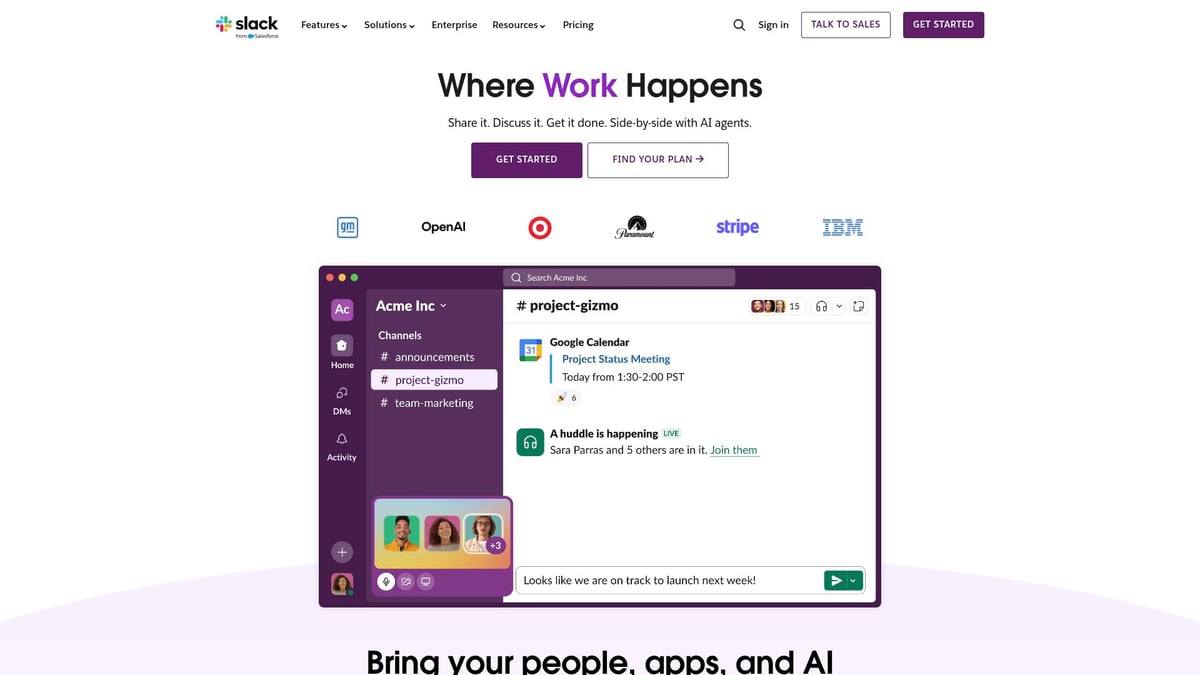
The free plan is robust, with paid options starting at $7.25 per user per month. Slack streamlines team communication, reducing email overload and keeping everyone in sync. Entrepreneurs can integrate hundreds of apps, from project management to file sharing, all within the Slack interface.
Customization is a strong suit, but with many channels, Slack can become noisy if not carefully managed. Remote-first companies often rely on Slack to coordinate product launches, share files, and host quick video calls.
As you scale, Slack remains one of the most adaptable tools for entrepreneurs, supporting fast-paced collaboration and transparent communication.
QuickBooks Online
Financial management is non-negotiable for success, and QuickBooks Online is a standout among tools for entrepreneurs handling bookkeeping, invoicing, and payroll. Plans start at $30 per month, providing automated expense tracking, tax calculations, and real-time financial insights.
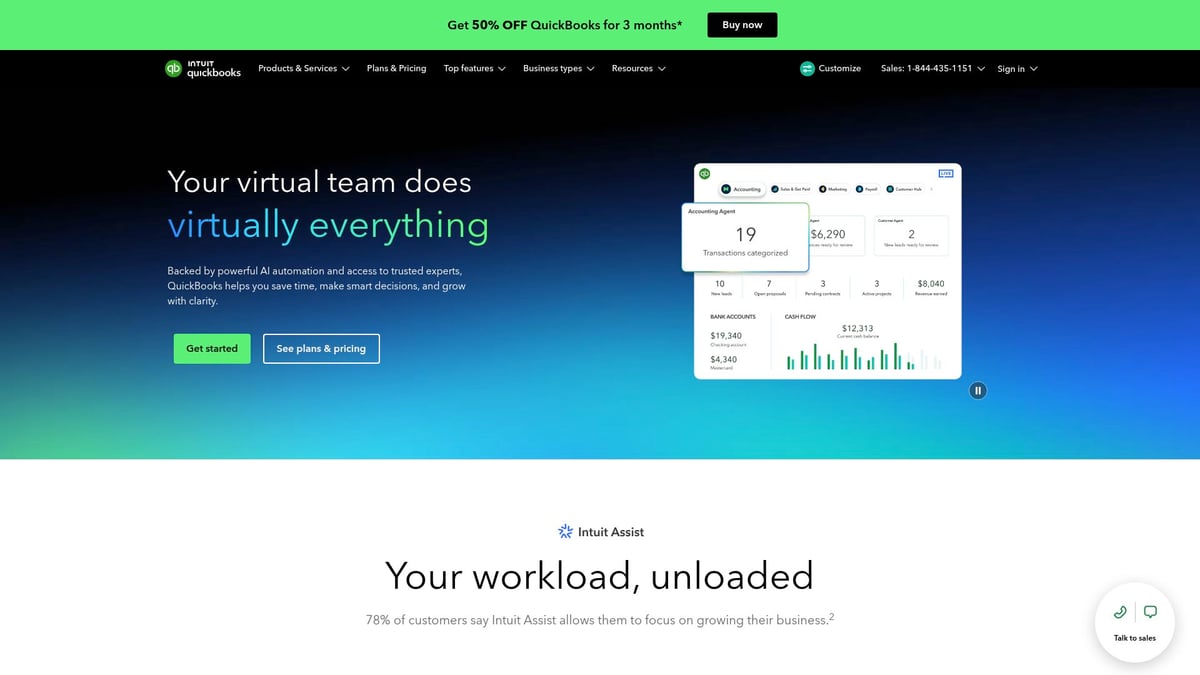
QuickBooks Online reduces manual errors and simplifies accounting, making it ideal for small business owners and freelancers. Its intuitive interface and scalability support startups at every growth stage. Advanced features, like payroll and in-depth reporting, are available on higher-tier plans.
Entrepreneurs report saving hours each month by automating expense tracking and tax prep. For a deep dive into financial strategies and more tools for entrepreneurs, see Finance essentials for startups.
If you’re seeking tools for entrepreneurs that make finances stress-free, QuickBooks Online deserves a spot in your toolkit.
Canva
Canva has revolutionized design for non-designers, earning its place among the top tools for entrepreneurs in 2025. With a free plan and a Pro version at $12.99 per month, Canva offers drag-and-drop design, templates, and brand kits for fast, professional graphics.
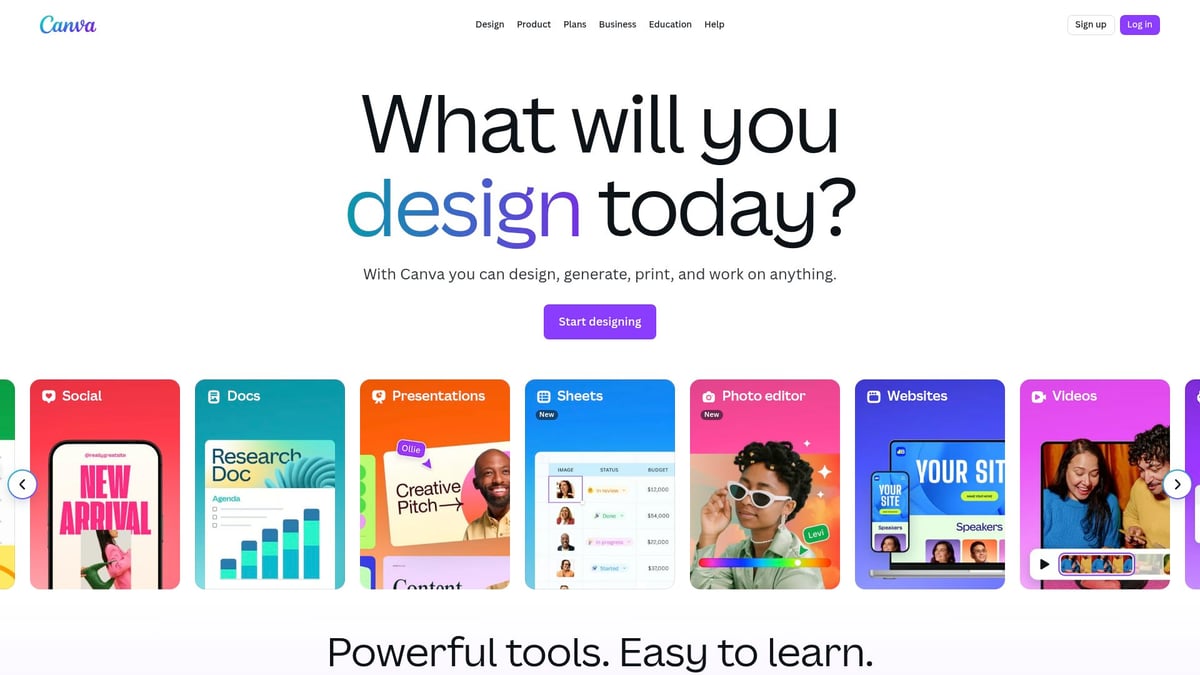
Entrepreneurs use Canva to create pitch decks, social media posts, and marketing materials in minutes. The huge template library and collaborative features allow teams to work together smoothly, ensuring brand consistency.
While Canva excels at making design accessible, it has limitations for advanced graphic work. Still, for most startups and small businesses, Canva’s speed and simplicity are unmatched.
If you’re looking for tools for entrepreneurs that amplify your marketing without hiring a designer, Canva is an obvious choice.
Asana
Asana is a project management leader, essential for entrepreneurs juggling multiple tasks and deadlines. With a free plan and premium options at $10.99 per user per month, Asana brings structure to your workflow.

Core features include task tracking, timelines, automation, and reporting. Asana keeps teams organized and accountable, making it one of the most reliable tools for entrepreneurs managing complex projects. Agencies and remote teams use Asana to coordinate multi-client work and visualize progress.
Integration with major apps and intuitive design streamline onboarding. However, simpler workflows may find the platform overwhelming.
If you need tools for entrepreneurs that keep projects on track and teams aligned, Asana delivers robust solutions for any business stage.
Shopify
Shopify remains a front-runner among e-commerce tools for entrepreneurs launching and scaling online stores. The basic plan starts at $39 per month, providing storefronts, payment processing, inventory management, and analytics.

Entrepreneurs praise Shopify’s user-friendly setup and scalability. With support for global payments and access to over 6,000 apps, you can customize your store for growth. The platform’s strong customer support and resources make it easy for new brands to launch quickly.
A potential drawback is transaction fees for payments processed outside Shopify’s system. Still, product-based startups use Shopify to reach international markets and streamline operations.
If you’re looking for tools for entrepreneurs to power e-commerce, Shopify is a proven, flexible solution.
Gusto
Gusto simplifies payroll and HR, making it one of the most comprehensive tools for entrepreneurs hiring remote or multi-state teams. Pricing starts at $40 per month plus $6 per user, covering payroll, benefits, compliance, and onboarding.
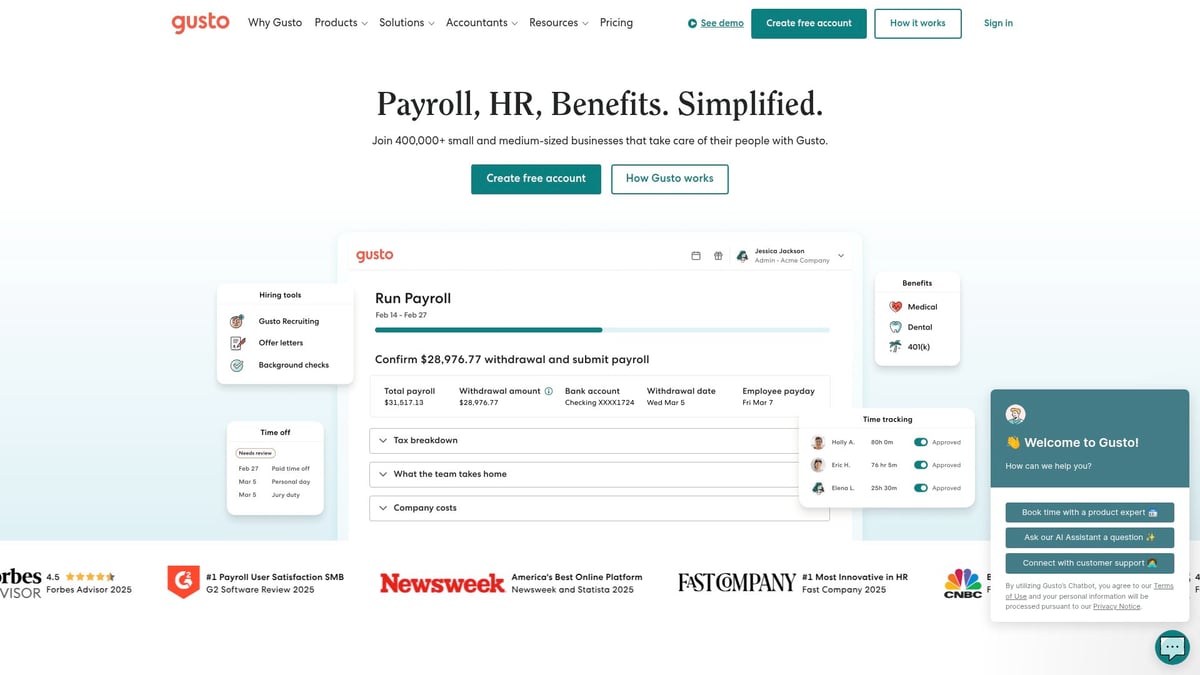
Automated payroll and benefits administration save time and reduce compliance risks. Gusto’s intuitive dashboard helps startups manage team growth and handle HR tasks efficiently. Although international support is limited, Gusto excels for US-based startups and SMEs.
Startups trust Gusto to manage payroll for distributed teams, ensuring everyone gets paid accurately and on time. For entrepreneurs seeking tools for entrepreneurs that remove HR headaches, Gusto is a top contender.
DocuSign
DocuSign leads the way in digital signatures, streamlining contract management for modern businesses. As one of the most trusted tools for entrepreneurs handling legal documents, DocuSign offers plans from $10 per user per month.

Features include secure e-signatures, document routing, templates, and compliance with global standards. Entrepreneurs accelerate deal closures by automating signature collection and tracking contract status. DocuSign integrates with major platforms, making it easy to embed into your existing workflow.
Advanced workflows require higher-tier plans, but for most startups, DocuSign’s mobile-friendly, secure solution is invaluable. If your business depends on quick, reliable agreements, DocuSign is a must-have among tools for entrepreneurs.
HubSpot CRM
HubSpot CRM is a powerhouse for managing customer relationships, making it one of the most popular tools for entrepreneurs focused on sales and growth. The core CRM is free, with paid upgrades starting at $20 per month.
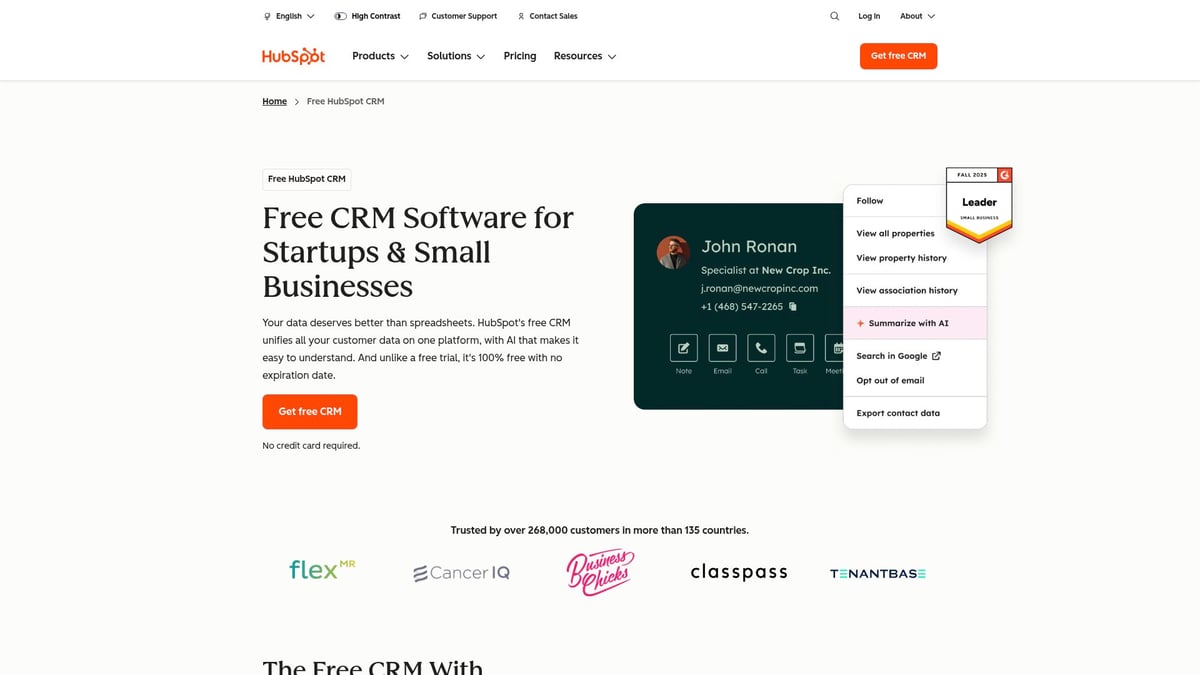
Key features include contact management, email tracking, sales pipelines, and marketing automation. HubSpot centralizes customer data and automates outreach, helping entrepreneurs nurture leads and track performance. The free tier is feature-rich, while advanced capabilities are available in paid plans.
Small businesses often boost conversions by automating follow-ups and integrating HubSpot with other tools. For tools for entrepreneurs that support growth from day one, HubSpot CRM is a smart investment.
Comparison Table: Essential Tools for Entrepreneurs in 2025
| Tool | Best For | Starting Price | Standout Feature |
|---|---|---|---|
| Notion | Knowledge & project management | Free/$8/user/mo | All-in-one workspace |
| Swisspreneur | Learning & networking | Free | Masterclasses, podcasts |
| Slack | Team communication | Free/$7.25/user/mo | Real-time channels |
| QuickBooks | Bookkeeping & finance | $30/mo | Automated accounting |
| Canva | Design & branding | Free/$12.99/mo | Templates, brand kits |
| Asana | Project management | Free/$10.99/user/mo | Visual timelines |
| Shopify | E-commerce | $39/mo | Storefront, analytics |
| Gusto | Payroll & HR | $40/mo+$6/user/mo | Automated payroll |
| DocuSign | E-signatures & contracts | $10/user/mo | Secure, compliant |
| HubSpot CRM | Customer management | Free/$20/mo | Sales automation |
Choosing the right tools for entrepreneurs is crucial for long-term success. Evaluate your needs, trial different platforms, and build a stack that supports your vision.
How to Choose the Right Tools for Your Startup
Choosing the right tools for entrepreneurs can feel overwhelming with so many options out there. The right tech stack can make or break your startup’s efficiency and growth. By following a clear process, you’ll avoid costly mistakes and build a toolkit that truly helps you scale.
Step 1: Define Your Startup’s Needs
Start by mapping out your business goals, team size, and current pain points. What core problems are you solving? Are you focused on productivity, finance, marketing, or team collaboration?
Turn these needs into a shortlist of must-have features. For new founders, resources like the How to start a business guide can help clarify which tools for entrepreneurs fit each stage of your journey.
Step 2: Evaluate Scalability and Integrations
Next, consider how your chosen tools for entrepreneurs will grow with your business. Ask yourself:
- Can the tool handle 10x more users or data as you scale?
- Does it integrate smoothly with your existing apps?
- How intuitive is the user experience for your team?
A simple comparison table can help:
| Factor | Why It Matters | What to Check |
|---|---|---|
| Scalability | Grows with your business | User limits, pricing tiers |
| Integrations | Avoids siloed data | API access, supported apps |
| User Experience | Boosts adoption, reduces churn | Onboarding, interface, support |
Always trial tools for entrepreneurs with a small team before a full rollout.
Step 3: Test, Learn, and Iterate
Most SaaS platforms offer free trials or freemium plans. Use these periods to test real workflows. Involve team members, gather feedback, and see how each tool fits your daily operations.
Look for strong community support and learning resources, which can speed up onboarding. Many startups initially pick “one-size-fits-all” tools, then migrate to more specialized solutions as their needs evolve.
Avoiding Tool Overload: Audit and Optimize
It’s easy to end up with too many tools for entrepreneurs, causing confusion and wasted spend. In fact, the SaaS adoption statistics for startups and SMEs show that the average startup now uses over 30 SaaS tools.
To stay efficient, audit your tech stack every quarter. Ask:
- Are there overlapping features?
- Which tools are rarely used?
- Does each tool provide clear ROI?
Create a checklist for assessing each tool’s fit, value, and long-term potential. If a platform no longer serves your needs, do not hesitate to switch. Many successful startups have streamlined their stacks to focus only on tools that truly drive growth.
Conclusion
Choosing tools for entrepreneurs is not a one-time task, but an ongoing process. By staying proactive, regularly reviewing your stack, and focusing on your unique needs, you will build a foundation for long-term success.
Future-Proofing Your Business with the Right Tech Stack
Adapting to rapid change is no longer just a competitive advantage, it is a requirement. To thrive in 2025, entrepreneurs need to future-proof their businesses by choosing the right tools for entrepreneurs. But what does “future-proofing” a tech stack really mean, and why should it be a top priority for founders?
What Does It Mean to Future-Proof Your Tech Stack?
Future-proofing means selecting tools for entrepreneurs that can grow, adapt, and integrate with emerging technologies. Instead of locking your business into rigid solutions, you choose flexible platforms designed to evolve as needs shift.
Consider this: Businesses that prioritized adaptable, cloud-based tools outperformed their peers during the pandemic. Their ability to pivot quickly, add new features, and connect with other services made all the difference. For entrepreneurs in 2025, building this kind of resilience into your tech stack is essential.
Key Trends Shaping Tools for Entrepreneurs in 2025
The landscape for tools for entrepreneurs is shaped by three major trends. First, AI-powered automation is transforming everything from marketing to customer support. Platforms now offer smart recommendations, predictive analytics, and process automation out of the box. For a deep dive, check out these insights on AI integration in SaaS platforms.
Second, data-driven decision-making is at the core of modern entrepreneurship. Real-time dashboards and analytics help founders spot trends, optimize spending, and measure ROI across every tool.
Third, integration-first platforms are rising. Entrepreneurs want tools that “talk” to each other, connecting workflows without manual effort. This trend reduces silos and unlocks more value from every investment.
Building a Flexible, Secure, and Modular Stack
Why is flexibility so crucial when choosing tools for entrepreneurs? A modular stack allows you to swap out, upgrade, or add new solutions as your business grows. This approach keeps you nimble and ready for whatever comes next.
Security, compliance, and data privacy are just as important. As regulations tighten and threats evolve, entrepreneurs must prioritize platforms with strong security practices and compliance certifications. Ask vendors about encryption, access controls, and regular audits before you commit.
Startups that embraced next-gen, modular tools have gained a real edge. Their ability to quickly adopt innovations lets them scale faster and respond to market changes with confidence.
Staying Ahead: Continuous Optimization and Learning
The best tools for entrepreneurs today might not be the right ones tomorrow. That is why regular tech stack reviews are vital. Audit your tools quarterly, assess ROI, and do not hesitate to trial new options when gaps appear.
Staying updated means joining founder communities, attending webinars, and reading actionable resources like these entrepreneur tips for growth. Continuous learning ensures you are not left behind as technology evolves.
By building a future-proof, flexible stack and staying curious, entrepreneurs can turn digital tools into lasting engines of growth.
Now that you’ve got a solid overview of the must-have tools for entrepreneurial success in 2025 you might be wondering how to keep up with everything that’s changing in the startup world. I get it—tech and business trends move fast and it can be tough to know what’s worth your time. That’s why I recommend joining a community of founders who are navigating these same challenges and sharing real insights along the way. You’ll get access to candid conversations expert advice and a network of people who get what you’re building. If you’re ready to connect and grow apply to our swiss founders community.

